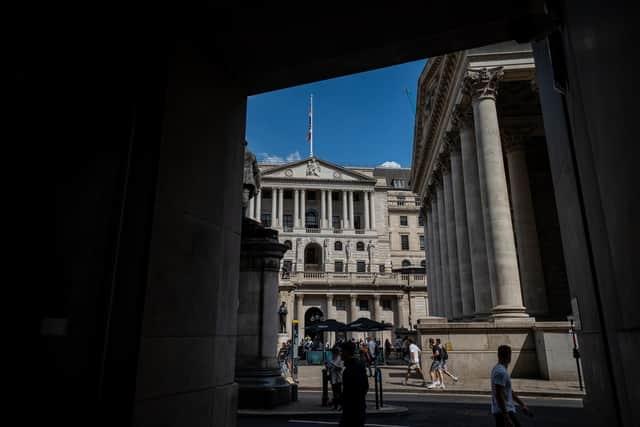Interest rates: Inflation, rates and mortgage crisis are disasters with no clear fix from Sunak's Government
The Bank of England has raised interest rates for the 13th time in a row, placing even more pressure on homeowners.
Interest rates have been hiked sharply by 0.5 per cent to 5 per cent, seeing even bigger increases in mortgage payments.
Advertisement
Hide AdAdvertisement
Hide AdInflation, which measures the rate of rising prices is stuck at 8.7 per cent, despite hopes it would fall. For context, it’s supposed to be at 2 per cent. The bank hopes raising rates will lower inflation, something vital for the economy, even if the continuous rises have made little impact so far.


This will see millions of people pay more for their mortgages, which are already close to 15-year high, and then hit the rental sector, where a failure to build affordable homes was already seeing prices rise as demand outstrips supply.
This all comes in the backdrop of a Prime Minister who has made “halving inflation” one of his five pledges, a promise looking increasingly unlikely. At the time, ministers thought it an easy win, with inflation expected to come down naturally.
One Tory MP told The Scotsman “it sounds sensible, but it’s stupid to promise something when you can’t control global affairs”.
The situation means mortgages, considered a ticking time bomb amid inflation, are now “exploding”, according to consumer champion Martin Lewis.
Influential think-tank the Institute for Fiscal Studies (IFS) warned higher rates would result in a drop of more than 20 per cent in disposable income for 1.4 million mortgage holders. That’s double the population of Edinburgh having 80 per cent of the money they normally do.
It is an unmitigated disaster, and one no party knows how to fix, or who to blame. At Prime Minister’s Questions on Wednesday, Labour leader Sir Keir Starmer blamed the Conservatives, but didn’t say how he’d fix it. Rishi Sunak argues it’s due to the “global macroeconomic situation", insisting the Government has offered support.
But it’s not enough, with the big two in Westminster seemingly accepting this is an issue with no immediate solution. The Lib Dems have called for a 'mortgage protection fund' to help, investing £3 billion, but experts claim this would only raise inflation higher.
Advertisement
Hide AdAdvertisement
Hide AdThe Chancellor has ruled out assisting homeowners, while the shadow chancellor Rachel Reeves dismissed a bailout as an "untargeted injection".
In lieu of answers, the response can only be the blame game, with briefings beginning to emerge from ministers this is actually the fault of the Bank of England.
This would be a sensible approach to avoiding responsibility, if Mr Sunak hadn’t explicitly told Sky News if inflation didn’t come down, "it's on me personally, I'm the PM”.
UK wages have risen at their fastest rate in 20 years, excluding the pandemic, but are still lagging behind the rate of inflation. Firms are passing on rising costs to consumers, hoping they can afford it.
With their money worth less, people want more money, something the Office for National Statistics says is driving inflation.
With no clear solution, parties are sticking to pointing the finger, and playing the waiting game.
Comments
Want to join the conversation? Please or to comment on this article.
